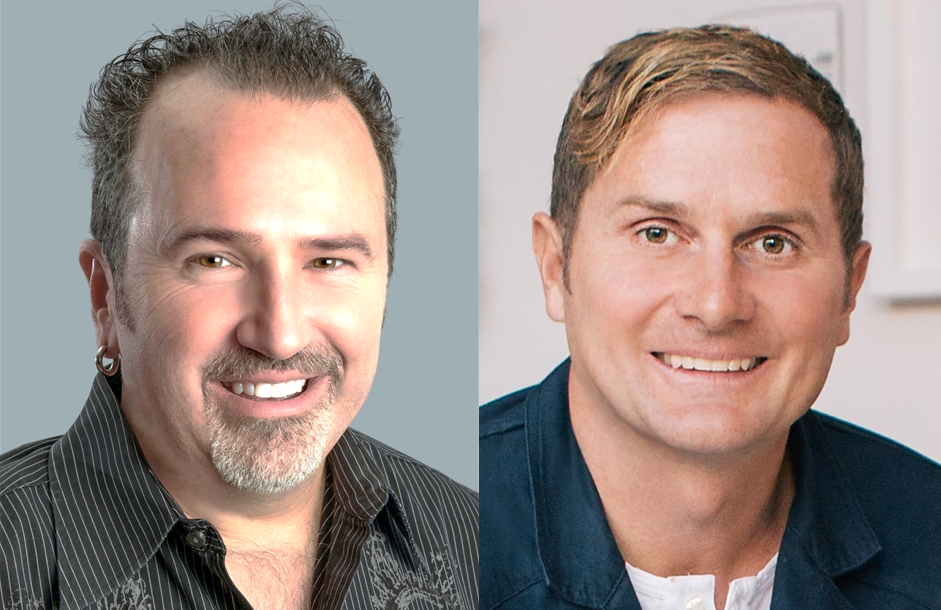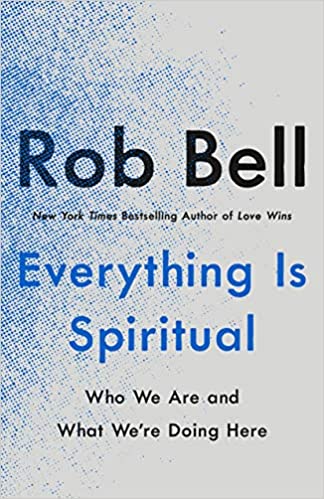
Book Review by Mark Umstot
Rob Bell’s Everything is Spiritual combines part memoir, part musings on science by a theologian, and, as usual, a fair share of rhetorical questions. Bell imbibed this book with the personal chatty nature that reads just as he speaks. Ever the communicator looking for ways to pass along knowledge effectively, he eschews chapters, section headings, or even page breaks. That will annoy some, but it lends itself to the simple words of a conversation. Bell doesn’t want you to think he’s preaching to you but instead sharing his innermost thoughts. And this book is his most personal.
This essay can’t be a formal review of a book. The book’s physical structure doesn’t lend itself to summarizing, chapter-wise, what Bell is trying to convey. So, instead, I’ll focus on his constructs and themes.
As the potential backbone, the raison d’être of realizing that everything is spiritual, Bell gives you intimate pieces of his story. From summers at the family cabin in the Upper Peninsula of Michigan, he found a shaping connection to everything nature: “Sand, soil, water, trees, dogs, rocks, bears, woods, bales of hay, my feet skimming across the surface of the lake—I grew up with a visceral sense of connection to the earth.” (p. 24)
Finally, Bell discovered an impetus in something beyond himself when he saw the Australian band Midnight Oil. Singer and song that not only stand up for a cause but do it with joy. In comparison to the guilt trips of speakers, coaches, and religious leaders manipulating to motivate and inspire, Midnight Oil indeed invited him in and stirred Bell to “give my life to something bigger than my life.” (p. 34) He discovered he could communicate what was swelling inside him with words, songs that came with a band he joined within short order. His spiritual journey continues through college, seminary, the love of his future-wife Kristen, his job as an assistant pastor, and eventually, to founding Mars Hill Church, which grew numerically and established his reputation.
And then came the Rob Bell we’ve come to know. He left Mars Hill Church. What started as a conversation in his therapist’s office leads to spiritual direction with Sister Virginia and, as usual, his wife Kristen making clear a path for Bell to follow.
Bell delights with a layman’s view of physics. It’s something that excites his soul as he writes about thingness—“the matter that everything is made of.” (p. 93) That thingness, exemplified by rocks. That thingness expands by life as in plants. Grows with minds, capable of making connections. And finally, we get to soul, a part of you that knows.
Bell illustrates as he eventually sees his soul. A woman in his church pulls him aside one Sunday morning and says to him, “You’re a mystic, and then she gestured toward all the people who were taking their seats, and she added, and they don’t realize it yet.” (p. 112) He invites you further into the conversation: “A mystic. Of course I am. Aren’t we all?” (p. 124)
Suddenly, the universe’s mystical nature comes into the equation with a multi-page discourse on the smallest parts of the universe. Bell discusses quantum physics and the science behind particles’ entanglement, leading to a description of how the act of observation forces a particle to choose its path. It’s all analogous to the idea that we live in a participatory universe as he argues that “No one is just seeing what happens. Seeing shapes what happens.” (p. 161)
Interconnectedness is the key for Bell. At the singularity before the big bang, the entire universe came from one point. All those particles existed within a whole. To which Bell claims, “Belonging is the natural state of the universe…. All exclusions have only ever taken place within one massive inclusion.” (p. 215) And as a logical extension, taking the science into the realm of God, Bell states that there’s no word for spiritual in the Hebrew scriptures because to call something spiritual would be to imply that other things aren’t. And thus, the title of the book emerges, “Everything is spiritual.”
While that interconnectedness is critical, Bell sees an essential distinction between “form” and “spirit.” We need both. The big bang brought the building blocks of forms. Forms are the thingness of the world, but spirit is what brings it life. Forms are essential; they are the instructions in life. But they also are by very nature constrictive. They need spirit. We are supposed to move beyond form, according to Bell. For example, he explains the process of learning to ride a bike. You have words from whoever is teaching you: keep pedaling, steer…. Those words help, but all of a sudden, a switch happens, “At which point you aren’t repeating those words because those words have become flesh.” (p. 118-119) Those instructions become a reality.
Bell expands this illustration by looking at how they celebrated communion at their church. They had the ritual, the words, the “form” correct. But the form isn’t the goal, “the goal is an experience of Spirit.”
The form, multiple times in Bell’s life, didn’t fit. He needed the spirit, “We’re surrounded by forms, forms are what make the world. The invitation is to allow Spirit to transform all these forms, so that they can become everything they can be, guiding us into a fuller experience of the depths of life.” (p. 124)
Life is messy and Bell’s adventures into the unknown keep illustrating that for him. From leaving Mars Hill Church to publishing a “wrecking ball” of a book with Love Wins to doing shows at a comedy club. “We’re all endlessly figuring it out. I realize I’ve been living for years with the assumption that at some point, you arrive. You get it all nailed down.” There are pastors/speakers/podcasters that think Rob Bell knows what he’s doing, that he has it all together, and, by his text, he states it isn’t true. The destination isn’t the purpose; the ride is. We all want to be a part of something larger than ourselves. And as Bell proclaims, we all do. From atoms and molecules to us.
Bell concludes with the story of your father’s sperm and your mother’s body. Yes. A beautiful story about the struggle for life. The “indomitable inwardness” of your father’s contribution overcoming all odds leading to the eventual acceptance by the egg to make you! Connectedness, form, spirit, you.
Rob Bell has always fostered a little bit of rebellion. He enjoys the tension. But he found out that curiosity is the cure for the ills of life. Bell has his share of personal failures and successes. But he’s slowly coming to what looks like stage six of James Fowler’s Stages of Faith: The “Universalizing” faith. Recognizing other people with compassion and understanding since we are a universal community, and love is the primary goal.
Bell’s self-help guru comes out often. But I don’t think he can help it. He’s allowed to think about the big questions. And, as he acknowledges, it would be easier if someone would tell us where to go or what’s next. But he moves the way Jesus did, “I saw how Jesus answered almost every question he’s asked with a question… What do you think? How do you read it? How do you interpret it? What do you say about it?” (p. 63) I remember being frustrated with Love Wins. Rob, simply tell me what you think! I’ve evolved in the last nine years. As he mentions, the New Testament phrase to “test everything” could easily be translated from the original Greek as “to welcome everything.” I’m comfortable with that. And so I’ve become comfortable with Bell.
I’ve also felt those same feelings Bell has about simply solving life. Can I simply get a handle on everything? A place for everything and everything in its place? If I can only have a checklist for my life, then I’ll be able to relax and just live. Bell explains that our problems aren’t the point. They just don’t matter in the participatory realm of this life. Our job is relationships.
My primary critique? Where is the bite? Where is the edge? Conservative voices will likely criticize and accuse Bell of more universalist views, a Cosmic Christ, panentheism, focusing on God’s immanence. But even the more progressive, spiritually-minded opinions will simply agree with everything Bell writes, summarizing it as to be nice, be immersive and participate in relationships, and be more spiritual. He tries to answer that. A bit.
“That annoying neighbor, chronic pain, toxic relatives, debt, the threat of physical violence, petty coworkers, children who continually break your heart, a lover who just left, another school shooting… Can something new be created out of even this? Yes. Spirit’s in all of it, in everything. In all those dark waters, hovering.” (p. 277-278)
Jesus is still calling to set a new standard for the self-righteous who believe they had the lock on their reputed lofty moralistic behavior. Those who have all the answers. Maybe Bell is on to something. Perhaps no practical answers but maybe…a listening ear, someone who wants to join our struggle with us. Bell explains that “The radical is not the person who wandered off the path into the deep weeds. The radical is the one who went back to the origins, to the roots, to how it all began…. it’s the radical who’s actually rediscovering the true path.” Everything is connected to everything else as Bell states. And if we agree, it’s time to embrace a willingness to go beyond our forms. Let the spirit in. See everything as spiritual.
Bell, R. (2020). Everything Is Spiritual: A Brief Guide to Who We Are and What We’re Doing Here. New York, NY: St. Martin’s Essentials.

